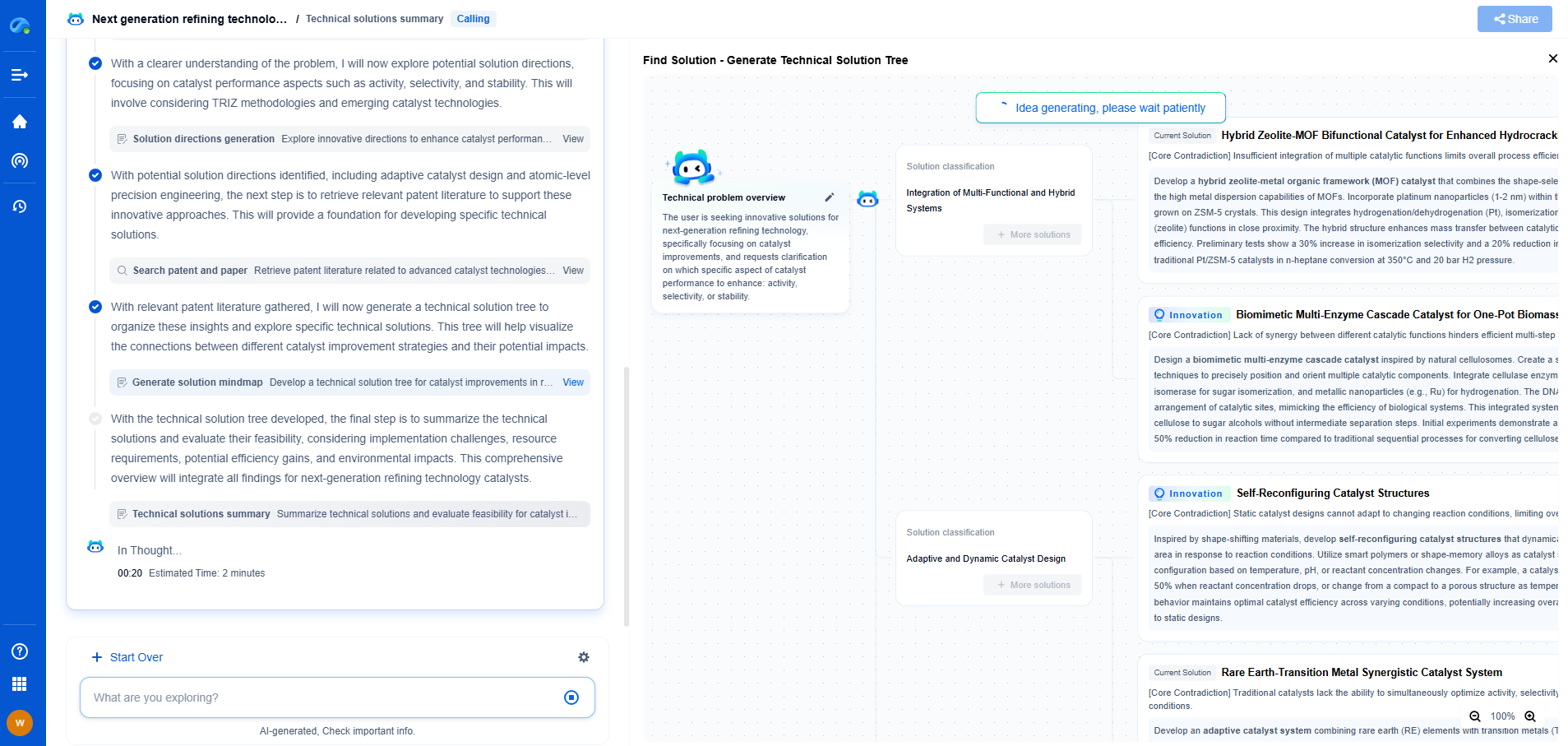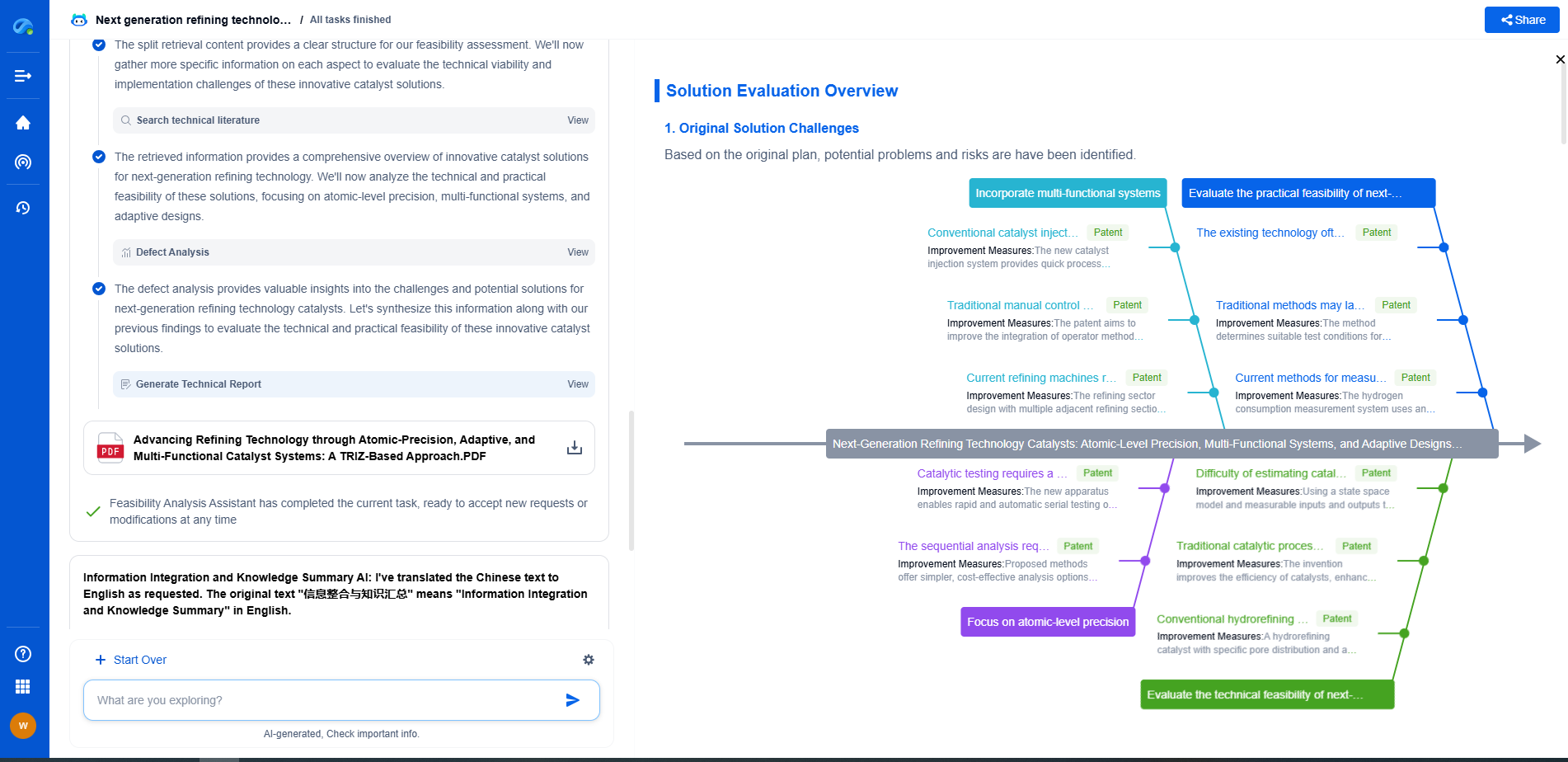Reusable filter materials in food and beverage processing
JUL 25, 2025 |
In today's food and beverage industry, efficiency, sustainability, and cost-effectiveness are crucial factors that drive innovation. Among the various processes involved, filtration plays a key role in ensuring product quality, safety, and consistency. Traditionally, single-use filters have been the norm, but there is a growing shift towards reusable filter materials. This change is motivated by environmental concerns, economic benefits, and advancements in filter technology. In this article, we will explore the various types of reusable filter materials, their benefits, and their applications in food and beverage processing.
Types of Reusable Filter Materials
1. Stainless Steel Filters
Stainless steel filters are widely used due to their durability and resistance to high temperatures and corrosive materials. They are ideal for applications that involve high-pressure processes or require frequent cleaning. These filters can be cleaned using backflushing, chemical cleaning, or even high-temperature sterilization, making them an excellent choice for long-term use.
2. Polymer-based Filters
Polymer-based filters, such as those made from polypropylene or polyester, offer a lightweight and cost-effective alternative to metal filters. These materials are chemically resistant and can withstand a range of temperatures, making them suitable for various applications in food processing. They can be easily cleaned and sanitized, extending their usability and reducing waste.
3. Ceramic Filters
Ceramic filters are known for their excellent filtration capabilities and durability. They are particularly effective in removing fine particles and microorganisms, making them suitable for applications requiring high levels of purity. Although they may be more expensive initially, their longevity and reusability make them a cost-effective option in the long run.
4. Cloth and Fabric Filters
These filters are often used for coarse filtration processes. Materials like cotton, nylon, and polyester are commonly used because they are durable and can be cleaned and reused multiple times. Cloth filters are ideal for applications such as juice clarification, where larger solids need to be removed.
Benefits of Reusable Filter Materials
1. Environmental Impact
One of the most significant advantages of reusable filter materials is their positive impact on the environment. By reducing the need for single-use filters, companies can significantly decrease their waste output. This reduction in waste not only helps in conserving natural resources but also minimizes the carbon footprint associated with the production and disposal of disposable filters.
2. Cost Efficiency
Although reusable filters may require a higher initial investment, they often result in lower long-term costs. Companies can save money by reducing the frequency of filter replacements and disposal costs. Additionally, the longevity of reusable filters means fewer purchases over time, contributing to overall cost savings.
3. Consistent Product Quality
Reusable filters are designed to withstand rigorous cleaning and sanitization processes without compromising their filtration capabilities. This reliability ensures that the product quality remains consistent, reducing the risk of contamination and defects. Consistent quality is crucial for maintaining brand reputation and customer satisfaction.
Applications in Food and Beverage Processing
1. Brewing Industry
In the brewing industry, filtration is essential for removing yeast, hops, and other solids from the final product. Stainless steel and polymer-based filters are commonly used due to their durability and ease of cleaning. Reusable filters help maintain the clarity and flavor of the beer while ensuring a more sustainable production process.
2. Juice and Beverage Production
For juice and beverage manufacturers, cloth and polymer filters are often used to clarify liquids and remove pulp and other particulates. The ability to clean and reuse these filters helps in maintaining a continuous production flow while reducing waste and costs.
3. Dairy Processing
In dairy processing, ceramic and stainless steel filters are used for applications such as milk clarification and whey separation. These filters are effective in handling the high-fat content and viscosity of dairy products, ensuring efficient separation and consistent quality.
Conclusion
The shift towards reusable filter materials in the food and beverage industry is a positive step towards sustainability and efficiency. By adopting these advanced filtration solutions, companies can benefit from reduced environmental impact, lower costs, and improved product quality. As technology continues to advance, the capabilities and applications of reusable filters will only expand, further revolutionizing the way we approach food and beverage processing.
From next-generation membrane materials to high-efficiency separation processes for pharmaceuticals, water treatment, food processing, or energy systems, the filtration & separation industry is rapidly evolving with a surge in material innovation, microstructure design, and process optimization.
Patsnap Eureka, our intelligent AI assistant built for R&D professionals in high-tech sectors, empowers you with real-time expert-level analysis, technology roadmap exploration, and strategic mapping of core patents—all within a seamless, user-friendly interface.
Whether you're designing the next high-throughput filter, optimizing nanostructured surfaces, or exploring new separation media for emerging industries—Patsnap Eureka gives you AI-driven insights in seconds, helping you move from ideation to innovation with confidence.
🚀 Start your free trial today and experience how Eureka transforms filtration innovation—from reactive to predictive.
- R&D
- Intellectual Property
- Life Sciences
- Materials
- Tech Scout
- Unparalleled Data Quality
- Higher Quality Content
- 60% Fewer Hallucinations
Browse by: Latest US Patents, China's latest patents, Technical Efficacy Thesaurus, Application Domain, Technology Topic, Popular Technical Reports.
© 2025 PatSnap. All rights reserved.Legal|Privacy policy|Modern Slavery Act Transparency Statement|Sitemap|About US| Contact US: help@patsnap.com

